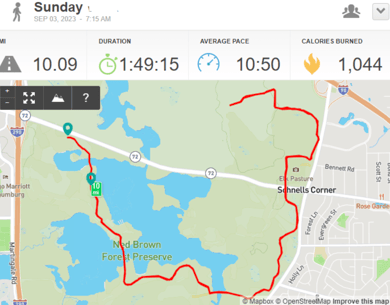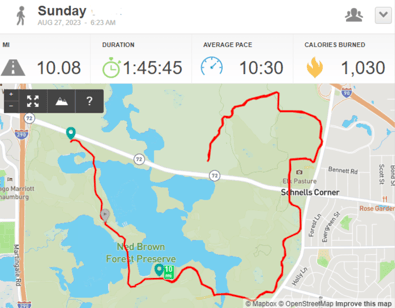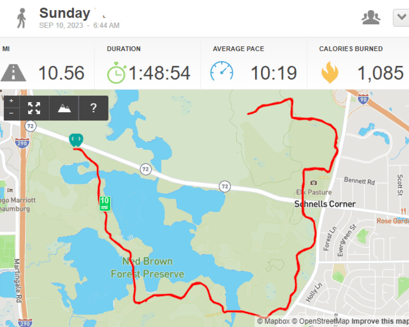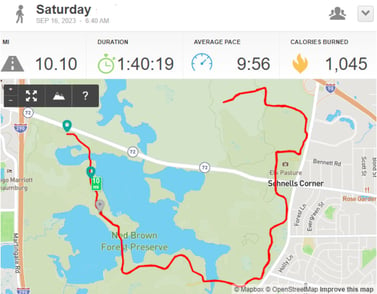Music and Marathon
Marathons, Music and Musings
My dad could be considered a half-marathon runner, having run the Chicago Half Marathon a few times. This was all thanks to his doctor, who told him he needed to be more active to have a balanced lipid profile. Now, he has found a passion for running. He's also a man who loves his music.
While he was training this fall, my curious mind was intrigued, and I wondered, could music, specifically songs with known lyrics, help you run faster?
My dad used to train on the nearby paved forest preserve trails, and every weekend, he would run approximately 10 miles. With the distance and path set as my constants, it was time to put my experiment into practice.
I helped him curate three playlists: one full of instrumental music, invariably the saxophone, my dad’s favorite instrument; one with all his favorite songs that consisted of lyrics he knew by heart; and an up-tempo playlist with a hilarious mix of the ridiculous songs.
Every time after the run, I used to interview him to check how he felt running.


Without Music:
My control in this experiment was no music. I observed that without music, my dad took slow and steady strides but kept up the pace. He also told me his legs felt heavy.
With Instrumental Music:
On the other hand, he noticed a slight flip in his pace when instrumental songs came on. Without the familiar lyrics to sing along to, his mind wandered. He became more aware of his fatigue, his muscles aching, his breath coming in short gasps. Although he performed better than no music, instrumental tracks didn't produce an endorphin-surging effect.




With Music and Familiar Lyrics:
Now the real debate begins: lyrics or no lyrics? Dad firmly believes that the key to a victorious run lies in the familiarity of the words. It's not just about the beat; it's about the soul-stirring connection to the song. He eloquently said “running is like a duet between the feet, and the music and lyrics are the poetic GPS guiding you through the course.”
With Uptempo Music and Familiar Lyrics:
As he ran, he noticed something interesting. The songs with lyrics seemed to give him an extra boost. He found himself running faster, his strides more confident. He felt less tired and less aware of the exertion. It was as if the music was carrying him along, propelling him forward. The magical concoction of beats, strides and lyrics made it smooth, transforming a mundane half marathon into a musical masterpiece.


Final Thoughts on his experience:
He discovered songs with lyrics that told a story or followed a beat that motivated him to push forward.
According to him, knowing the lyrics distracts from the pain and monotony of running. It's like a lyrical painkiller, numbing the legs and elevating the spirit.
My dad likes to tell anyone, with the fitting soundtrack everyone will be crossing that finish line in no time. It turns out that up-tempo music with ridiculous lyrics is the best performance enhancer.
The Science Behind this:
Now let’s delve into the science of it all: BioRhythms
The word biorhythm refers to the natural rhythms and cycles of the body that affect our energy levels and capabilities. These rhythms are related to our circadian rhythms, which regulate sleep-wake cycles, and our ultradian rhythms, which occur in cycles shorter than a day. Ultradian Rhythms is where tempo comes in for runners.
Listening to music that matches your natural cadence and rhythm while running can help optimize your pace and form. The beat of the music acts as an external cue to help entrain your movement patterns. Matching the tempo of your music to your step rate allows your body to move more efficiently and minimizes extraneous motion that wastes energy. Tuning into your internal rhythms through music can reduce perceived effort during a run. With the right musical tempo, runners can enter a flow state, and running feels almost effortless. Thus, leveraging biorhythm and musical tempo can significantly improve running economy and help runners optimize their performance.
Music with high beats per minute (BPM) can provide a mental boost and lead to heart rate and breathing changes, potentially affecting running efficiency.
In conclusion, while the concept of biorhythms remains controversial in scientific circles, evidence suggests that the body's internal cycles and external factors, such as music tempo, can influence exercise performance, including running efficiency. Further research is needed to understand the extent of this influence fully.